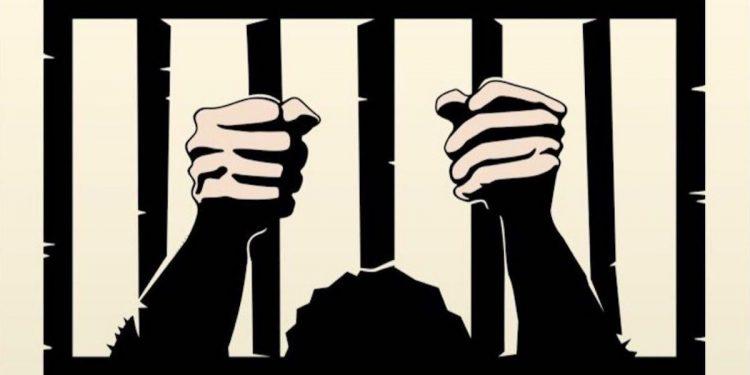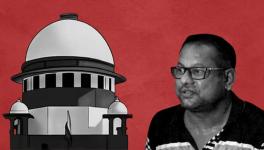Political Prisoners Part of Broader Dissent Against State Excesses

The increasing demand for the release of political prisoners is not intended to glorify them. They are, in fact, part of the larger tribe of Indians fighting for minorities and the marginalised, writes Achintya Anita Gurumurthy
—-
It has been over 500 days since Khalid Saifi’s incarceration and 300 for Umar Khalid in the northeast Delhi riots cases and almost three weeks since the custodial demise of Father Stan Swamy in the Bhima-Koregaon case—all arrested under the dreaded Unlawful Activities (Prevention) Act, (UAPA) 1967. The arrests have put the spotlight back on the category of ‘political prisoners’, who are imprisoned for opposing the government via their actions or beliefs.
India’s long history of political imprisonment spans right from the Freedom Movement—when Bhagat Singh and his comrades declared the famous hunger strike in prison in 1929 with one of their key demands being recognised as ‘political prisoners’—to dissenters, like Saifi, Khalid and Swamy, against the current government.
Also read: Survivors of our hell
Language of the law
The logic behind incarceration does not only pertain to procedural questions—such as in cases of custodial violence or denial of rights to trial, legal representation and bail—with regard to which the oppressed are particularly disadvantaged. It is also the language of the law that heavily punishes oppressed communities. For instance, the colonial-era Criminal Tribes Act, 1871, which tagged 237 tribes and castes as criminals, was replaced by the Habitual Offenders Act, 1952, but nomadic communities continue to be stigmatised.
Also read: The Neglected tribes of India
In contrast, the category of ‘political prisoners’ in law pertains to incarceration of individuals based on their actions or beliefs. While the assertion reveals the importance of the term in our civil rights discourse, considering that the law in its very rhetoric and assumptions is embedded in power relations, is it necessary to make a case at all for specially recognising this category of prisoners?
Oppression and quelling of dissent
Political prisoners in any society indicate the authoritarian character of the state and its centralisation of power. The dilution of labour laws, mass unemployment and rampant privatisation, and the alleged assassination plots and Maoist conspiracies manufactured using the UAPA indicate an overbearing government ought to disregard equality and crush dissent.
The ongoing political crisis in India is the result of the ultimate collapse of liberalism and its institutions and the consequent rise of authoritarianism. The hegemonic ideological control by the far-right emerged dialectically as a combination of consent and coercion.
Narendra Modi’s election in 2014 was the indirect embrace between the facade of neoliberalism and the far-right with the subsequent assertion of the economic elite and government control of the thought process of the masses.
Also read: What’s So Neoliberal About Narendra Modi’s India Anyway?
Through its mass organisations, the Bharatiya Janata Party continued to smear the anti-CAA and NRC demonstrations and farmers’ protest—spinning theories about international conspiracies while continuing to sanction and punish dissenters and protesters. The mistreatment of political prisoners and the use of draconian laws, like the UAPA, need to be examined in the context of the intertwining of neoliberalism and the far-right.
While the language of criminal law, bail and human rights is premised on the functioning of liberal institutions, the advent of the far-right and government control have spelled its demise.
In his article ‘Right-Wing Politics, and the Cultures of Cruelty’, Aijaz Ahmad suggests that fascism further created “cultures of cruelty”, characterised by brutal social sanctioning and a generalised ethical numbness.
This analysis becomes particularly important while understanding the experiences of political prisoners. The lack of humanity in the incarceration of pregnant student activist Safoora Zargar and the continued imprisonment and ill-treatment of professor G.N. Saibaba indicate the plight of political prisoners in “cultures of cruelty”.
Also read: India’s cruelty to its critics shows the deterioration of the world’s largest democracy
Prominent economist and activist Jean Dreze recently remarked that Swamy’s death was an act of torture by the Indian state. The Parkinson’s-afflicted Swamy was repeatedly denied bail, a straw and slippers.
The expansive powers granted to the government under the UAPA ensure that cruelty is meted out to political prisoners. This was further visible in the denial of slippers to ex-Congress councillor Ishrat Jahan in the Delhi riots case, and the refusal of medical care to professor Hany Babu and spectacles to Gautam Navlakha, both accused in the Bhima-Koregaon case.
Relevance of political prisoners
The increasing demand for releasing political prisoners, opposing injustice, inequality and oppression, is not intended to glorify them. In fact, they are a part of the larger tribe of Indians fighting for minorities and the marginalised, weak and poor sections of society under the current dispensation.
Also read: ‘Swiftly’ release political prisoners in Kashmir, US urges Indian government
The inspiring examples of Sudha Bharadwaj, fighting for the rights of Dalits and Adivasis, and Gulfisha Fatima, for protesting the CAA and the NRC, show how political prisoners are intertwined with the causes of the oppressed and minorities.
The brutal repression of people’s movements illustrates how Indians fighting for justice are specifically targeted. The category of political prisoner clearly highlights the foregrounding of the class-caste character of laws.
The experience of student activists Natasha Narwal and Devangana Kalita—both arrested in the Delhi riots case—and other fellow inmates for protesting unjust laws and demanding the rights of marginalised communities at Tihar Central Jail points out to the increasing incarceration of political prisoners and the just demand for their immediate release.
(Achintya Anita Gurumurthy is a law student who is interested in Marxist and Ambedkarite theory and politics. The views expressed are personal.)
Get the latest reports & analysis with people's perspective on Protests, movements & deep analytical videos, discussions of the current affairs in your Telegram app. Subscribe to NewsClick's Telegram channel & get Real-Time updates on stories, as they get published on our website.
























